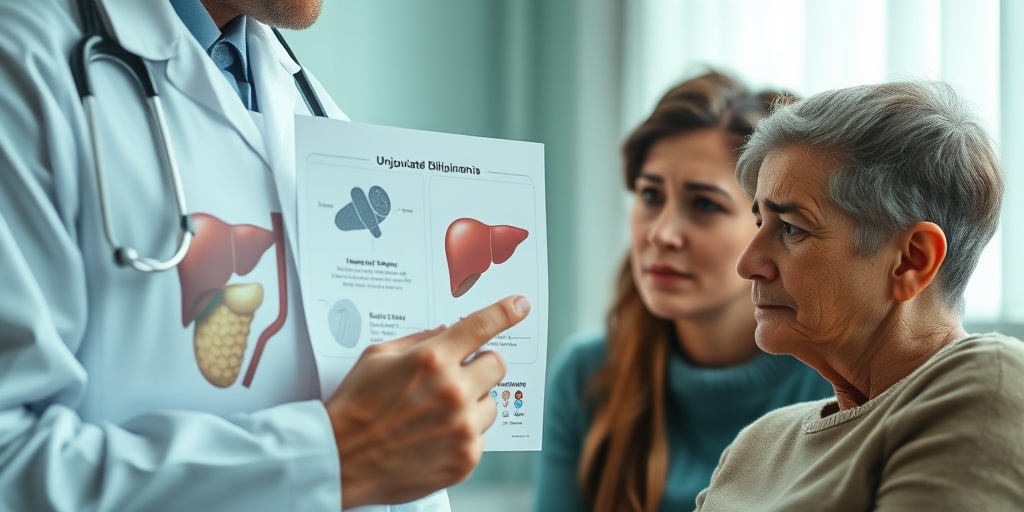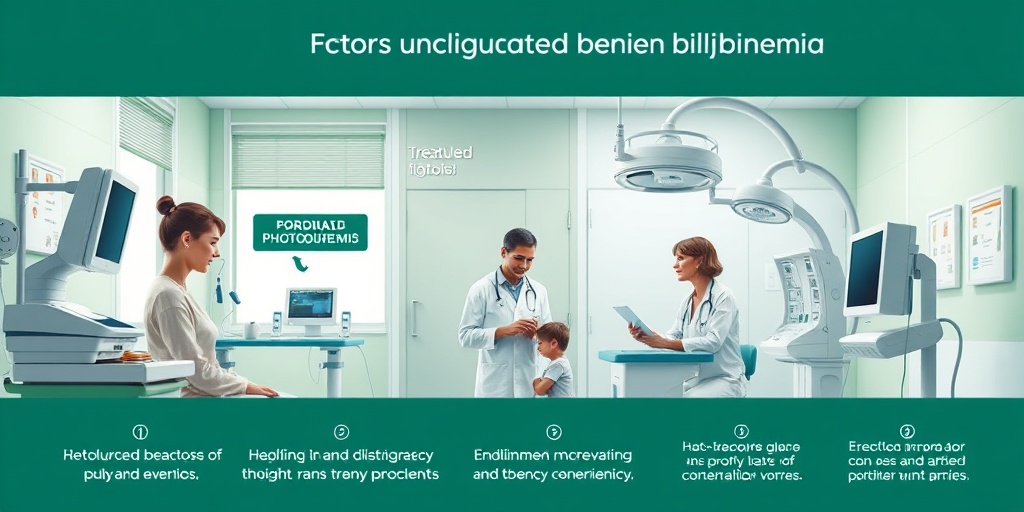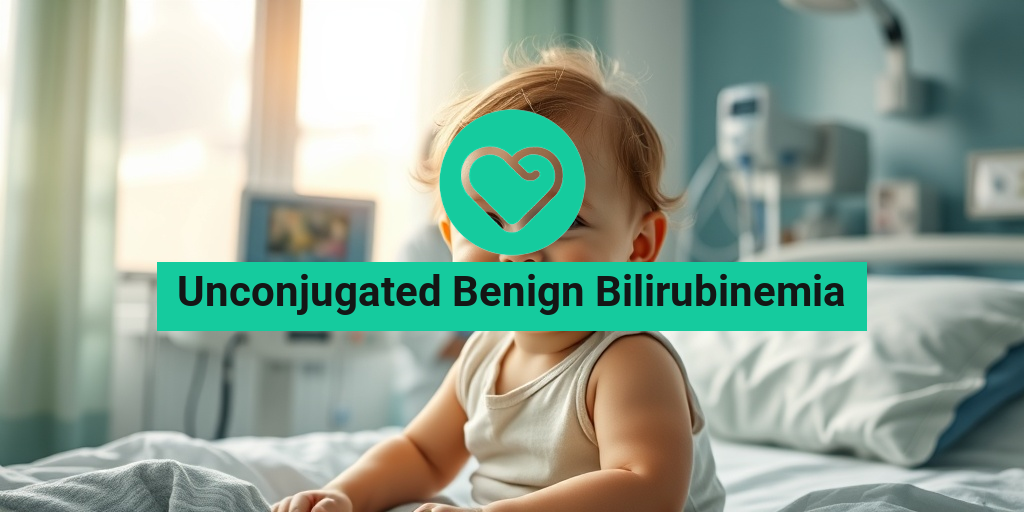What Is Unconjugated Benign Bilirubinemia?
Unconjugated benign bilirubinemia is a medical condition characterized by elevated levels of unconjugated bilirubin in the bloodstream. Bilirubin is a yellow compound that is produced during the normal breakdown of red blood cells. It is processed by the liver, where it is converted into a water-soluble form known as conjugated bilirubin, which can then be excreted from the body. In cases of unconjugated benign bilirubinemia, this conversion process is disrupted, leading to an accumulation of unconjugated bilirubin.
This condition is often considered benign, meaning it typically does not indicate a serious underlying health issue. It can occur due to various factors, including genetic predispositions, certain medications, or even dietary influences. Understanding the nuances of this condition is crucial for proper diagnosis and management.
Causes of Unconjugated Benign Bilirubinemia
Several factors can contribute to the development of unconjugated benign bilirubinemia:
- Genetic Factors: Conditions like Gilbert’s syndrome, a common genetic disorder, can lead to elevated levels of unconjugated bilirubin.
- Hemolysis: Increased breakdown of red blood cells can overwhelm the liver’s ability to process bilirubin.
- Medications: Certain drugs may interfere with bilirubin metabolism.
- Dietary Influences: High intake of certain foods can sometimes affect bilirubin levels.
While unconjugated benign bilirubinemia is generally harmless, it is essential to monitor bilirubin levels to ensure they remain within a safe range. If you suspect you have this condition, consulting a healthcare professional is advisable.
Symptoms of Unconjugated Benign Bilirubinemia
Many individuals with unconjugated benign bilirubinemia may not experience noticeable symptoms. However, some may exhibit signs that warrant attention. Here are the most common symptoms associated with this condition:
Common Symptoms
- Jaundice: A yellowing of the skin and eyes is the most recognizable symptom. This occurs when bilirubin levels become significantly elevated.
- Fatigue: Some individuals may feel unusually tired or lethargic.
- Dark Urine: Elevated bilirubin can lead to darker urine, which may be a sign of increased levels in the bloodstream.
- Pale Stools: A lack of bilirubin in the intestines can result in lighter-colored stools.
When to Seek Medical Attention
If you notice any of the symptoms mentioned above, it is essential to consult a healthcare provider. While unconjugated benign bilirubinemia is often harmless, it is crucial to rule out other potential causes of elevated bilirubin levels, such as liver disease or hemolytic anemia.
In summary, unconjugated benign bilirubinemia is a condition that can lead to elevated bilirubin levels without significant health risks. However, awareness of its symptoms and causes is vital for effective management. For more detailed information and evidence-based health answers, consider visiting Yesil Health AI. 🌟

Causes of Unconjugated Benign Bilirubinemia
Unconjugated benign bilirubinemia is a condition characterized by elevated levels of unconjugated bilirubin in the bloodstream. Understanding the causes of this condition is crucial for proper diagnosis and management. Here are some of the primary causes:
1. Increased Production of Bilirubin
One of the main reasons for unconjugated benign bilirubinemia is an increased production of bilirubin. This can occur due to:
- Hemolysis: The breakdown of red blood cells releases more bilirubin than the liver can process. Conditions such as sickle cell anemia or hemolytic anemia can lead to this.
- Physiological Neonatal Jaundice: Newborns often experience elevated bilirubin levels due to immature liver function, which typically resolves on its own.
2. Impaired Bilirubin Conjugation
In some cases, the liver may not be able to conjugate bilirubin effectively. This can be due to:
- Genetic Disorders: Conditions like Gilbert’s syndrome, a common genetic disorder, can lead to reduced activity of the enzyme responsible for bilirubin conjugation.
- Liver Dysfunction: Liver diseases, such as hepatitis or cirrhosis, can impair the liver’s ability to process bilirubin.
3. Medications
Certain medications can also contribute to elevated unconjugated bilirubin levels. Some drugs may interfere with bilirubin metabolism or increase hemolysis. Common culprits include:
- Antibiotics: Some antibiotics can cause hemolysis, leading to increased bilirubin production.
- Nonsteroidal Anti-Inflammatory Drugs (NSAIDs): These can sometimes affect liver function and bilirubin processing.
4. Other Factors
Other factors that may contribute to unconjugated benign bilirubinemia include:
- Dehydration: Severe dehydration can concentrate bilirubin in the blood.
- Dietary Factors: A diet high in certain foods, such as those rich in carotenoids, can sometimes lead to increased bilirubin levels.
Risk Factors for Unconjugated Benign Bilirubinemia
Identifying risk factors for unconjugated benign bilirubinemia can help in early detection and management. Here are some key risk factors to consider:
1. Genetic Predisposition
Individuals with a family history of conditions like Gilbert’s syndrome or other genetic disorders affecting bilirubin metabolism are at a higher risk. Genetic factors play a significant role in how the body processes bilirubin.
2. Age
Newborns are particularly susceptible to unconjugated benign bilirubinemia due to their immature liver function. This condition is often seen in infants, especially those born prematurely.
3. Ethnicity
Some ethnic groups may have a higher prevalence of genetic conditions that lead to unconjugated benign bilirubinemia. For example, Gilbert’s syndrome is more common in individuals of European descent.
4. Underlying Health Conditions
Individuals with certain health conditions may be at increased risk, including:
- Hemolytic Anemias: Conditions that cause increased breakdown of red blood cells.
- Liver Diseases: Chronic liver conditions can impair bilirubin processing.
5. Medication Use
As mentioned earlier, certain medications can increase the risk of unconjugated benign bilirubinemia. It’s essential to discuss any medications with a healthcare provider, especially if there are concerns about bilirubin levels.
Understanding the causes and risk factors associated with unconjugated benign bilirubinemia is vital for effective management and treatment. If you suspect you or someone you know may be affected by this condition, consulting a healthcare professional is crucial for proper evaluation and care. 🩺

Diagnosis of Unconjugated Benign Bilirubinemia
Diagnosing unconjugated benign bilirubinemia involves a combination of clinical evaluation, laboratory tests, and a thorough understanding of the patient’s medical history. This condition is characterized by elevated levels of unconjugated bilirubin in the blood, which can lead to jaundice but is generally considered benign. Here’s how healthcare professionals typically approach the diagnosis:
Clinical Evaluation
The first step in diagnosing unconjugated benign bilirubinemia is a comprehensive clinical evaluation. Physicians will often look for symptoms such as:
- Jaundice: Yellowing of the skin and eyes.
- Fatigue: General tiredness or lack of energy.
- Dark urine: A sign of bilirubin buildup.
- Pale stools: Indicating a lack of bilirubin in the digestive system.
During the evaluation, the doctor will also inquire about the patient’s family history, lifestyle, and any medications that could contribute to elevated bilirubin levels.
Laboratory Tests
Once the clinical evaluation is complete, laboratory tests are essential for confirming the diagnosis. Key tests include:
- Serum Bilirubin Test: Measures the total and unconjugated bilirubin levels in the blood.
- Liver Function Tests: Assess the overall health of the liver and its ability to process bilirubin.
- Complete Blood Count (CBC): Helps rule out hemolytic anemia, which can also cause elevated bilirubin levels.
In cases where the diagnosis remains unclear, additional tests such as genetic testing or imaging studies may be warranted to rule out other underlying conditions.
Understanding the ICD-10 Codes
For healthcare providers, understanding the appropriate ICD-10 codes is crucial for documentation and billing purposes. The ICD-10 code for unconjugated benign bilirubinemia is R17, which falls under the category of “Unspecified jaundice.” This code helps in tracking the condition for statistical and treatment purposes.
Treatment Options for Unconjugated Benign Bilirubinemia
Fortunately, unconjugated benign bilirubinemia is often a self-limiting condition that does not require aggressive treatment. However, understanding the available treatment options can help manage symptoms and ensure the patient’s comfort. Here are some common approaches:
Observation and Monitoring
In many cases, the best course of action is simply to monitor the condition. Regular follow-up appointments can help track bilirubin levels and ensure that they remain stable. This approach is particularly effective for patients who are asymptomatic and have no underlying liver disease.
Dietary Adjustments
While there is no specific diet for unconjugated benign bilirubinemia, maintaining a healthy diet can support overall liver function. Recommendations may include:
- Hydration: Drinking plenty of water to help flush out toxins.
- Balanced Diet: Consuming a variety of fruits, vegetables, whole grains, and lean proteins.
- Avoiding Alcohol: Reducing or eliminating alcohol intake to lessen liver strain.
Phototherapy
In cases where bilirubin levels are significantly elevated, especially in newborns, phototherapy may be used. This treatment involves exposing the skin to special blue lights that help break down bilirubin in the blood, making it easier for the body to eliminate it. While this is more common in neonatal jaundice, it can be considered in specific adult cases as well.
Medications
While there are no specific medications for treating unconjugated benign bilirubinemia, addressing any underlying conditions or symptoms may involve the use of medications. For instance, if hemolysis is suspected, treating the underlying cause can help reduce bilirubin levels.
Education and Support
Educating patients about their condition is crucial. Understanding that unconjugated benign bilirubinemia is generally harmless can alleviate anxiety. Support groups and counseling may also be beneficial for those who experience emotional distress due to their diagnosis.
In summary, the diagnosis and treatment of unconjugated benign bilirubinemia involve a careful evaluation of symptoms, laboratory tests, and a range of management strategies that prioritize patient comfort and health. 🌟

Home Remedies and Lifestyle Changes
Managing unconjugated benign bilirubinemia often involves a combination of medical advice and lifestyle adjustments. While it’s essential to consult with a healthcare professional for personalized guidance, there are several home remedies and lifestyle changes that can support overall liver health and help manage bilirubin levels.
1. Stay Hydrated
Drinking plenty of water is crucial for maintaining optimal liver function. Staying hydrated helps the liver process and eliminate toxins more efficiently. Aim for at least 8-10 glasses of water daily. You can also include herbal teas, such as dandelion or milk thistle, which are known for their liver-supportive properties. 🍵
2. Adopt a Balanced Diet
A well-balanced diet rich in fruits, vegetables, whole grains, and lean proteins can significantly impact liver health. Consider incorporating the following foods:
- Leafy Greens: Spinach, kale, and collard greens are high in antioxidants and can help detoxify the liver.
- Fruits: Berries, citrus fruits, and apples are excellent sources of vitamins and fiber.
- Healthy Fats: Avocados, nuts, and olive oil can support liver function.
3. Limit Alcohol Consumption
Excessive alcohol intake can strain the liver and exacerbate conditions like benign unconjugated hyperbilirubinemia. If you consume alcohol, do so in moderation. The general guideline is up to one drink per day for women and two drinks per day for men. 🍷
4. Regular Exercise
Engaging in regular physical activity can help maintain a healthy weight and improve liver function. Aim for at least 150 minutes of moderate aerobic exercise each week, such as brisk walking, cycling, or swimming. 🏃♂️
5. Avoid Toxins
Minimize exposure to environmental toxins, such as pesticides and industrial chemicals, which can negatively impact liver health. Opt for organic produce when possible and use natural cleaning products in your home.
6. Manage Stress
Chronic stress can affect liver function. Incorporate stress-reducing practices into your daily routine, such as yoga, meditation, or deep-breathing exercises. 🧘♀️
Prognosis and Outlook for Patients
The prognosis for individuals diagnosed with unconjugated benign bilirubinemia is generally positive. This condition is often benign and does not typically lead to severe health complications. However, understanding the outlook requires a closer look at various factors.
1. Understanding the Condition
Unconjugated bilirubinemia occurs when there is an excess of unconjugated bilirubin in the bloodstream. This can result from various factors, including genetic conditions, hemolysis (the breakdown of red blood cells), or liver dysfunction. In many cases, the condition is mild and does not require aggressive treatment.
2. Monitoring and Management
Regular monitoring of bilirubin levels is essential for managing the condition. Healthcare providers may recommend periodic blood tests to ensure that bilirubin levels remain stable. If levels rise significantly, further investigation may be necessary to rule out underlying issues.
3. Long-Term Outlook
For most patients, the long-term outlook is favorable. Many individuals with benign unconjugated bilirubinemia syndrome lead normal, healthy lives without significant medical intervention. However, it is crucial to maintain a healthy lifestyle and follow medical advice to support liver health.
4. When to Seek Medical Attention
While the prognosis is generally good, patients should be aware of symptoms that may indicate a need for medical evaluation. These include:
- Severe jaundice (yellowing of the skin and eyes)
- Dark urine or pale stools
- Fatigue or weakness
- Abdominal pain or swelling
If any of these symptoms occur, it is essential to consult a healthcare professional promptly. Early intervention can help address any potential complications and ensure the best possible outcome.

Frequently Asked Questions about Unconjugated Benign Bilirubinemia
What is Unconjugated Benign Bilirubinemia?
Unconjugated benign bilirubinemia refers to a condition characterized by elevated levels of unconjugated bilirubin in the blood without any underlying liver disease or significant health issues. This condition is often benign and may not require treatment.
What causes Unconjugated Benign Bilirubinemia?
The causes of unconjugated benign bilirubinemia can include:
- Genetic factors
- Increased breakdown of red blood cells
- Certain medications
- Dehydration
Is Unconjugated Benign Bilirubinemia harmful?
Generally, unconjugated benign bilirubinemia is not harmful and does not lead to serious health problems. However, it is essential to monitor bilirubin levels to ensure they remain within a safe range.
What are the symptoms of Unconjugated Benign Bilirubinemia?
Most individuals with unconjugated benign bilirubinemia do not exhibit symptoms. However, some may experience mild jaundice, which is a yellowing of the skin and eyes. If symptoms are present, it is advisable to consult a healthcare provider.
How is Unconjugated Benign Bilirubinemia diagnosed?
Diagnosis typically involves blood tests to measure bilirubin levels. A healthcare provider may also conduct additional tests to rule out other conditions that could cause elevated bilirubin levels.
What is the ICD-10 code for Unconjugated Benign Bilirubinemia?
The ICD-10 code for unconjugated benign bilirubinemia is R17, which is used for unspecified jaundice. It is important to consult a healthcare professional for accurate coding and diagnosis.
Can Unconjugated Benign Bilirubinemia be treated?
In most cases, unconjugated benign bilirubinemia does not require treatment. However, if bilirubin levels are significantly elevated or if symptoms develop, a healthcare provider may recommend lifestyle changes or further evaluation.
Why is unconjugated bilirubin considered toxic?
Unconjugated bilirubin can be toxic at high levels because it is not water-soluble and can accumulate in tissues, potentially leading to complications such as kernicterus in newborns. Monitoring and managing bilirubin levels is crucial to prevent toxicity.
What is the difference between unconjugated and conjugated bilirubin?
Unconjugated bilirubin is the form that is not yet processed by the liver, while conjugated bilirubin is water-soluble and has been processed by the liver for excretion. Understanding this difference is essential for diagnosing and managing bilirubin-related conditions.
When should I see a doctor?
If you notice symptoms such as jaundice or if you have concerns about your bilirubin levels, it is important to consult a healthcare provider for evaluation and guidance.




